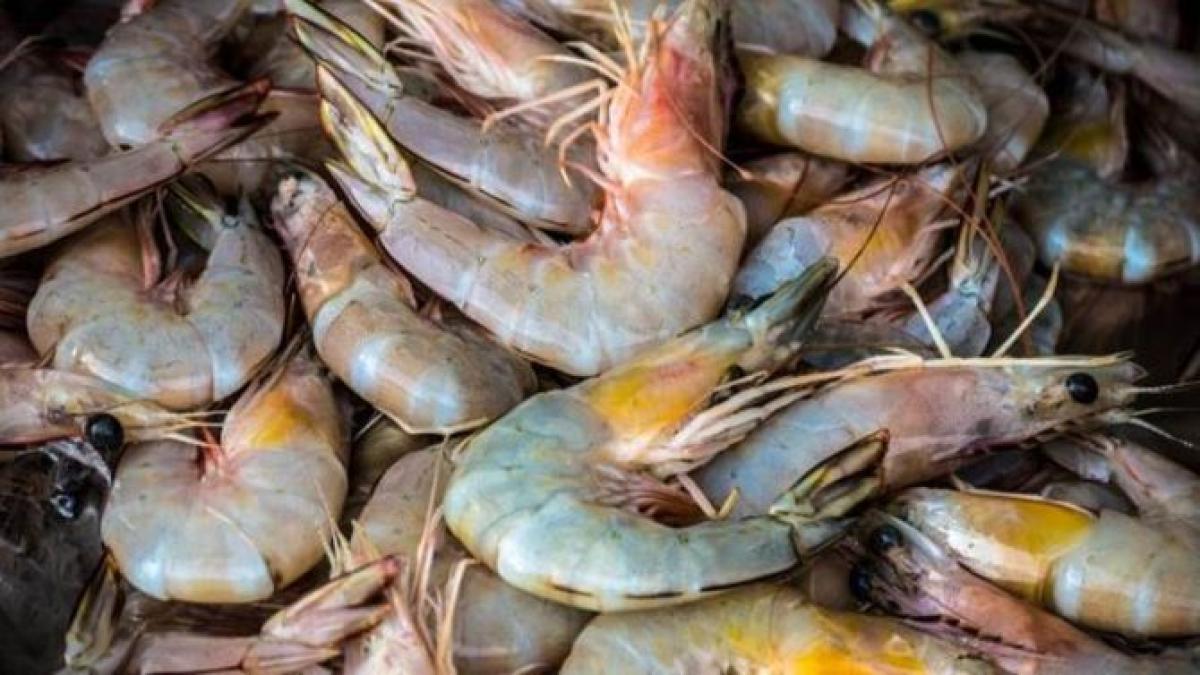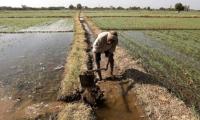Saline Water Aquaculture Boost: Centre Calls for Collaboration
x
India's Centre calls for collaboration to boost saline water aquaculture in Haryana, Punjab, Rajasthan, and Uttar Pradesh, aiming to utilize saline land resources more effectively for shrimp farming.

New Delhi, Apr 7 (PTI) The Centre on Monday called for collaborative efforts between the states, Indian Council of Agriculture Research (ICAR), and other agencies to develop strategies for utilizing saline land resources more effectively for aquaculture in four states -- Haryana, Punjab, Rajasthan and Uttar Pradesh.
A virtual review meeting, chaired by Union Fisheries Secretary Abhilaksh Likhi, discussed ground challenges and gaps faced by farmers in saline water aquaculture in these four states.
Besides collaborative efforts, the meeting emphasised conduct gap analysis for the development of potential clusters and on expanding cultivation area in the identified 25 districts of the four states as well as promoting shrimp consumption in northern India, an official statement said.
The four states were encouraged to leverage Krishi Vigyan Kendras (KVKs) to disseminate technical knowledge, identify new areas for saline aquaculture, and conduct outreach-based research.
Furthermore, the meeting highlighted the need for a National Level Committee to review guidelines for shrimp culture in freshwater/inland farms and to prepare a roadmap for the sustainable development of saline aquaculture in northern Indian states.
The states were also urged to formulate beneficiary-oriented action plans and communicate specific gaps to the Union Ministry for targeted central support in key areas such as marketing infrastructure, disease management, regulatory frameworks, research, and capacity building.
Farmers from Haryana, Punjab, Rajasthan, and Uttar Pradesh raised several challenges that are impacting the viability and sustainability of their saline water aquaculture operations.
They highlighted issues of high setup costs, inadequate subsidy coverage, and the restrictive 2-hectare area limit for saline water aquaculture.
Other significant concerns included fluctuating salinity levels, high land lease rates, reductions in subsidies, and the lack of locally available, high-quality seed.
In addition, farmers pointed out the absence of proper marketing infrastructure, including markets and cold storage facilities, as well as rising input costs and low market prices for their products.
"These factors are contributing to low returns on investment, prompting farmers to seek increased support from the Department of Fisheries to overcome these obstacles and ensure the sustainability of their aquaculture practices," the statement said.
In Haryana, Punjab, Rajasthan, and Uttar Pradesh, approximately 58,000 hectares of saline area have been identified, yet only around 2,608 hectares are currently being utilized.
In the meeting, state fisheries officials from Uttar Pradesh highlighted the vast potential of inland saline aquaculture, covering 1.37 lakh hectares in districts such as Mathura, Agra, Hathras, and Raebareli, with significant initiatives supported under the Pradhan Mantri Matsya Sampada Yojana (PMMSY).
Rajasthan reported growing momentum in shrimp farming in salt-affected districts like Churu and Ganganagar, with approximately 500 hectares dedicated to the cultivation of Penaeus vannamei, milkfish, and pearl spot. Additionally, a diagnostic lab has been established in Churu under PMMSY.
Punjab shared its achievements in expanding shrimp farming in southwestern districts such as Sri Muktsar Sahib and Fazilka, bolstered by the Blue Revolution and PMMSY schemes. Notable developments include a 30-tonne cold storage and ice plant and a dedicated training centre.
Haryana demonstrated significant progress in saline aquaculture, having achieved a production of 13,914 tonnes with an investment of Rs 57.09 crore under PMMSY. '
"There is huge potential to convert these saline-affected areas into aquaculture hubs," the ministry said.
These saline-affected lands, often unsuitable for traditional agriculture, hold immense potential to be transformed from wastelands to wealth lands.
India, being the second-largest producer of cultured shrimp globally, earns over 65 per cent of its seafood export value from shrimp alone.
Despite the country's vast potential in brackish water and shrimp aquaculture, particularly in saline-affected areas, inland saline aquaculture resources continue to remain significantly underutilized.
A virtual review meeting, chaired by Union Fisheries Secretary Abhilaksh Likhi, discussed ground challenges and gaps faced by farmers in saline water aquaculture in these four states.
Besides collaborative efforts, the meeting emphasised conduct gap analysis for the development of potential clusters and on expanding cultivation area in the identified 25 districts of the four states as well as promoting shrimp consumption in northern India, an official statement said.
The four states were encouraged to leverage Krishi Vigyan Kendras (KVKs) to disseminate technical knowledge, identify new areas for saline aquaculture, and conduct outreach-based research.
Furthermore, the meeting highlighted the need for a National Level Committee to review guidelines for shrimp culture in freshwater/inland farms and to prepare a roadmap for the sustainable development of saline aquaculture in northern Indian states.
The states were also urged to formulate beneficiary-oriented action plans and communicate specific gaps to the Union Ministry for targeted central support in key areas such as marketing infrastructure, disease management, regulatory frameworks, research, and capacity building.
Farmers from Haryana, Punjab, Rajasthan, and Uttar Pradesh raised several challenges that are impacting the viability and sustainability of their saline water aquaculture operations.
They highlighted issues of high setup costs, inadequate subsidy coverage, and the restrictive 2-hectare area limit for saline water aquaculture.
Other significant concerns included fluctuating salinity levels, high land lease rates, reductions in subsidies, and the lack of locally available, high-quality seed.
In addition, farmers pointed out the absence of proper marketing infrastructure, including markets and cold storage facilities, as well as rising input costs and low market prices for their products.
"These factors are contributing to low returns on investment, prompting farmers to seek increased support from the Department of Fisheries to overcome these obstacles and ensure the sustainability of their aquaculture practices," the statement said.
In Haryana, Punjab, Rajasthan, and Uttar Pradesh, approximately 58,000 hectares of saline area have been identified, yet only around 2,608 hectares are currently being utilized.
In the meeting, state fisheries officials from Uttar Pradesh highlighted the vast potential of inland saline aquaculture, covering 1.37 lakh hectares in districts such as Mathura, Agra, Hathras, and Raebareli, with significant initiatives supported under the Pradhan Mantri Matsya Sampada Yojana (PMMSY).
Rajasthan reported growing momentum in shrimp farming in salt-affected districts like Churu and Ganganagar, with approximately 500 hectares dedicated to the cultivation of Penaeus vannamei, milkfish, and pearl spot. Additionally, a diagnostic lab has been established in Churu under PMMSY.
Punjab shared its achievements in expanding shrimp farming in southwestern districts such as Sri Muktsar Sahib and Fazilka, bolstered by the Blue Revolution and PMMSY schemes. Notable developments include a 30-tonne cold storage and ice plant and a dedicated training centre.
Haryana demonstrated significant progress in saline aquaculture, having achieved a production of 13,914 tonnes with an investment of Rs 57.09 crore under PMMSY. '
"There is huge potential to convert these saline-affected areas into aquaculture hubs," the ministry said.
These saline-affected lands, often unsuitable for traditional agriculture, hold immense potential to be transformed from wastelands to wealth lands.
India, being the second-largest producer of cultured shrimp globally, earns over 65 per cent of its seafood export value from shrimp alone.
Despite the country's vast potential in brackish water and shrimp aquaculture, particularly in saline-affected areas, inland saline aquaculture resources continue to remain significantly underutilized.
You May Like To Read
TODAY'S MOST TRADED COMPANIES
- Company Name
- Price
- Volume
- Vodafone Idea L
- 7.94 ( -1.00)
- 53169786
- GTL Infrastructure
- 1.61 (+ 6.62)
- 32431916
- Spicejet Ltd.
- 53.52 (+ 9.09)
- 18083686
- G G Engineering
- 0.81 ( -3.57)
- 15819052
- Reliance Power L
- 44.37 (+ 1.88)
- 14874542







 © 2025 Rediff.com India Limited. All rights reserved.
© 2025 Rediff.com India Limited. All rights reserved.